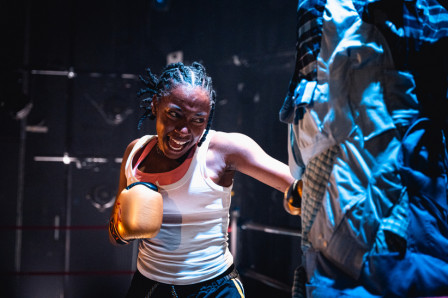Review: FATAL FLOOR at Bread and Roses Theatre
Fatal Floor, showing at The Bread & Roses Theatre as part of the Lambeth Fringe, is in many ways a deceptively simple play. The staging is minimal, with sparse lighting, barely-there props and little to no technical elements. This simplicity, however, works in its favour.

Little is needed to make the central concept land, which is: three strangers Joe, Jake, and Tara, step into a lift, only to realise they’ve actually all died and are now stuck in a kind of purgatory. The lift doesn’t take them down floors but back in time to the moments in their lives they most regret. The many themes and concepts are striking when set against such stripped-back staging. The only ‘special effect’ as it were, is a screen in the lift indicating the year they’re travelling to. Everything else is raw. It's a fascinating idea and makes for a compelling piece of drama.
At its core, this is a morality play, echoing Sartre’s ‘No Exit’ (which the characters even reference): three strangers trapped together in a locked room with no exit, for eternity. Fatal Floor asks the question: what constitutes a life well lived? The play is preoccupied with regret, reflection and the idea of letting go and moving on. Although its central message seems to lean towards ‘no regrets’, that isn’t always made clear. There's a lot of potential in this premise, which may be why the play occasionally struggles to pin down exactly what it wants to say. Still, Fatal Floor has heart. The involvement of three writers (Richard Fitchett, Wally Sewell, and Liam O’Grady), who each tackle a different characters backstory, may explain some of this unevenness. Still, the ambitions of Fatal Floor are clear, even when the execution falters.
Each character revisits the moment they most regret. For instance, Joe (a street artist played with quiet turmoil by Alex Jonas) regrets sabotaging another artist’s chance with a top dealer, believing his interference indirectly led to the artist’s suicide. It’s a dark, ethically complex moment. Yet when Joe returns to the past, like the others, he finds that nothing he does would have changed the outcome. The message? Perhaps our decisions aren’t as pivotal or profound as we’d like to believe. There’s a cynical bite to that and it’s smartly played. This quiet pessimism is embodied perfectly by the lift attendant, played with brilliant deadpan menace by Peter Saracen, who acts as a sort of ferryman of the dead. His dark humour and straight-faced cynicism sharpen the tone considerably. The scenes in the lift are the strongest parts of the play. They ground the piece and allow the characters’ interactions and their reckoning with death to truly shine. These moments also create space for the play’s core themes to surface: morality, consequence and the ethical weight of our choices. By contrast, the flashback scenes in which the characters revisit their past regrets don’t always hold up as well. They can slip into feeling bloated, weighed down by long stretches of dialogue that lack the sharpness needed to fully engage the audience. Still, these scenes raise compelling questions: Are we meant to believe the characters' actions were ultimately futile? How much impact do seemingly small decisions really have on the course of our lives?
There’s both drama and comedy here, and both are executed well. Simon Brandon, as the slacker ish Jake, handles the comic beats superbly, bringing levity with a wry, albeit depressing charm. The humour really lands, especially the dry, British pessimism that cuts through the heavier themes. Saracen’s lift attendant is the clearest example of this, injecting sardonic wit into the afterlife. Elsewhere, however, the humour can feel forced. Tara’s obsession with astrology, for example, provides some laughs - until it veers into implausibility. Emma Riches plays Tara with conviction but some choices feel like they were written purely for comedic effect, sacrificing believability in the process. Still, Fatal Floor has heart. The cast is strong, and each actor commits fully to their role. The play explores significant, timely, and current themes - from contemporary art and wealth to activism and astrology. While it doesn’t always explore them deeply, it gestures at something bigger. The central question, which seems to be ‘how do we measure a life well lived?’, is strikingly powerful.
There’s definitely much to be enjoyed here. The concept is compelling, the performances are engaging and the moments inside the lift are genuinely thought-provoking. Although some parts feel uneven, this play remains entertaining and introspective enough to linger with you. On the whole, this is a promising concept with standout performances and moments of brilliance, but muddled execution holds it back. Worth seeing for the elevator scenes alone.
Fatal Floor played at Bread and Roses Theatre as part of Lambeth Fringe 2025.
Latest News

 Full cast announced for London premiere of IN PIECES
26 February 2026 at 16:07
Full cast announced for London premiere of IN PIECES
26 February 2026 at 16:07

 DEATH NOTE THE MUSICAL to come to London's Barbican Theatre
26 February 2026 at 11:56
DEATH NOTE THE MUSICAL to come to London's Barbican Theatre
26 February 2026 at 11:56

 Review: BITCH BOXER at Arcola Theatre
26 February 2026 at 07:09
Review: BITCH BOXER at Arcola Theatre
26 February 2026 at 07:09

 Shakespeare Plays to Watch in London in 2026
25 February 2026 at 23:13
Shakespeare Plays to Watch in London in 2026
25 February 2026 at 23:13
